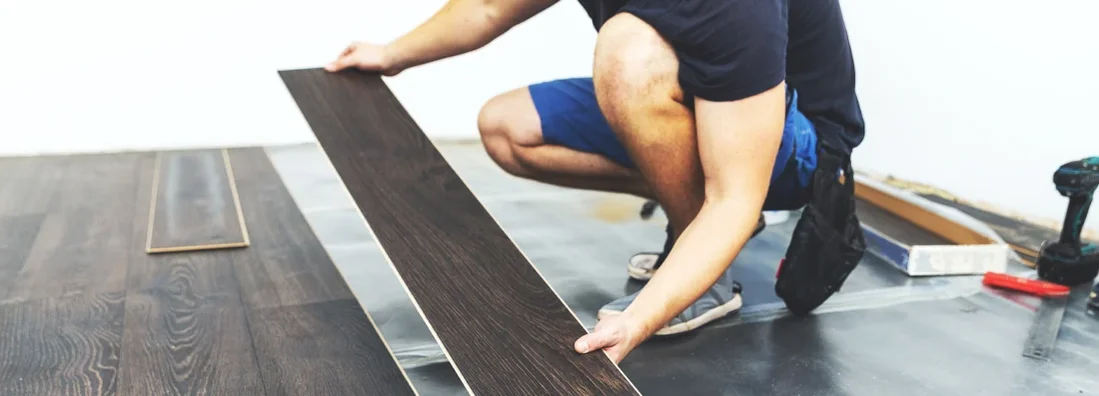Flooring Contractor Insurance
The right coverage can help prevent losses due to property damage, theft, lawsuits, and more.

Flooring contractors have a lot to keep in mind while on the job. Whether working on new building construction, home improvement jobs, or additions, you need to be sure your business is properly covered by the right flooring contractor insurance. Having enough coverage can help get you the reimbursement you need in case of incidents like fire damage, vandalism, and more.
An independent insurance agent can help you get set up with the right kind of business insurance for flooring contractors. They'll get you matched to the right policy for your unique company. But first, here's a closer look at flooring insurance.
Quick Flooring Contractor Industry Statistics
When considering coverage for your flooring contractor business, it's sometimes helpful to see an overview of the entire industry. Here are some quick flooring installation industry stats to paint a better picture.
- As of 2023, there are more than 121,652 flooring installation businesses operating in the U.S.
- The number of businesses in this industry has grown by roughly 1.5% per year since 2018.
- There are about 188,235 flooring installation contractors working in the U.S. this year.
- Last year, the flooring installation industry market size was about $29.8 billion.
Since the flooring installation industry continues to grow over time, so does the need for all employees and businesses in this field to be properly insured.
Why Flooring Contractors Need Liability Insurance
A necessary part of your flooring contractors insurance policy is liability coverage. It protects your business’s assets in case of a lawsuit filed against you by a third party. It covers legal defense fees, court costs, and financial damages.
Your independent insurance agent will likely recommend the following insurance types:
- Commercial general liability insurance: Covers lawsuits related to bodily injury and personal property damage caused to third parties by your business.
- Commercial auto liability insurance: Covers lawsuits related to incidents with company vehicles.
- Hired or non-owned auto liability insurance: Covers lawsuit costs if an employee causes an accident while driving a personally owned vehicle to do a work-related errand or while driving a rented vehicle to transport supplies to a job site.
- Employment practices liability insurance: Covers lawsuit costs if a current or former employee sues your business for discrimination, harassment, or wrongful termination.
- Umbrella insurance: Provides additional liability coverage beyond the limits of your existing policies in increments of $1 million.
Working with an independent insurance agent is a great way to ensure that your business gets set up with all the types of liability coverage it really needs.
Why Flooring Contractors Insurance Should Include Workers' Compensation
Workers' compensation insurance is required of employers in most states. Even if your company is exempt, this coverage is often key for the financial well-being of your business. It covers the cost of medical treatments for injuries and illnesses sustained by workers while on the job or as a result of job duties, provides a continuation of wages while the employee is recovering, and even offers a death benefit in the rare instance that a flooring installation worker is fatally injured due to their job.
Basically, workers' comp protects your business from devastating lawsuits related to workplace injuries. In exchange for your business providing this coverage, employees and their families are exempt from suing your company for work-related injury, illness, or death. Flooring installers insurance needs to include workers' comp coverage if the business has at least one employee. However, independent flooring contractors without employees likely don't have a need for this type of coverage.
Why Flooring Contractors Also Need Commercial Property Coverage
If you have a central office where you greet customers, make appointments, handle administrative work, or store your tools and materials, your flooring contractor insurance should include coverage for the property kept in this location, as well as the office building itself. You'll likely need some or all of the following types of coverage in your policy:
- Commercial property insurance: Reimburses your business for losses related to covered damage, vandalism, or destruction of your company property like an office building or storefront, as well as inventory, supplies, and materials kept inside.
- Builders risk insurance: Covers the property that's used and stored on the job site during a new construction project.
- Inland marine insurance: Covers your tools and equipment while they're in transit to and from job sites.
Your independent insurance agent can explain your coverage options and help you get the coverage you need to protect your business property, including buildings, tools, and materials.
How an Independent Insurance Agent Can Help You Get the Right Coverage
Building a comprehensive flooring contractors insurance policy for your business doesn't have to be a complicated process. When you work with an independent insurance agent, you can rest assured your coverage needs will be met.
These agents can help you identify your exposures, recommend the right coverage types to mitigate losses due to those risks, and shop around to find you a selection of competitively priced policies. In the end, they'll get you matched to the policy that offers the best blend of coverage and cost.
https://www.ibisworld.com/industry-statistics/number-of-businesses/flooring-installers-united-states/#:~:text=There%20are%20117%2C375%20Flooring%20Installers,increase%20of%201.5%25%20from%202022.
https://www.ibisworld.com/industry-statistics/employment/flooring-installers-united-states/#:~:text=There%20are%20183%2C283%20people%20employed,the%20US%20as%20of%202023.
https://www.ibisworld.com/industry-statistics/market-size/flooring-installers-united-states/#:~:text=The%20market%20size%2C%20measured%20by,declined%20%2D3.2%25%20in%202022.
